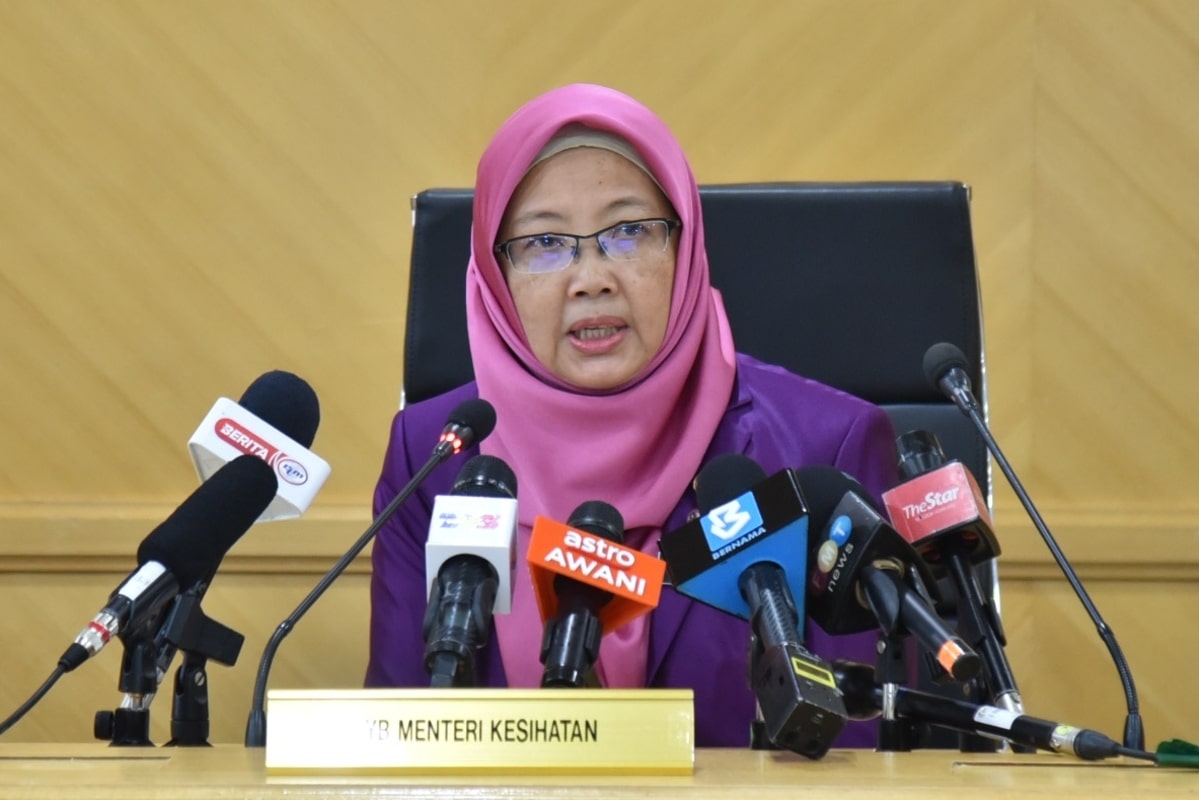KUALA LUMPUR, Oct 6 – Dr Zaliha Mustafa has maintained that she had the ministerial authority to remove liquid nicotine from the Poisons List without approval from the Poisons Board.
The health minister – in an affidavit filed in the High Court here yesterday – said she had been advised by the senior federal counsel that based on Section 6 of the Poisons Act 1952 (Act 366), she was only mandated to get “consultation” from the Poisons Board about her decision for the exemption order and “without a requirement to obtain approval from the Poisons Board”.
“Therefore, I state that the decision on the said poisons order was lawful, rational, and had no procedural errors,” said Dr Zaliha.
The health minister’s affidavit was made for a lawsuit filed against her by the Malaysian Council for Tobacco Control (MCTC), the Malaysian Green Lung Association (MGLA), and Voice of the Children (VoC) over the declassification of liquid and gel nicotine used in e-cigarettes and vaporisers as a scheduled poison from the Poisons Act.
Section 6 of the Poisons Act states that the minister may, “after consultation with the Poisons Board”, add to, remove from, or reinstate in the Poisons List any substance that the minister deems “fit and proper”.
In a supporting affidavit filed on behalf of MCTC, MGLA, and VoC in the High Court last June 30, the applicants, citing a New Straits Times report, pointed out that Dr Zaliha had vetoed unanimous rejection from the Poisons Board in its consultation session last March 29 to the proposed liquid nicotine delisting and gone ahead with the exemption order last March 31.
In response, the health minister again reiterated that Section 6 of the Poisons Act “only provided for the need for me to have a consultation session with the Poisons Board, but the decision for the said exemption was not subject to the decision by the Poisons Board”.
The Poisons Board is an independent body established under the Poisons Act that serves to advise the health minister; it consists of the Health director-general, as well as representatives from the MOH’s pharmaceutical services; the Departments of Chemistry, Agriculture, Veterinary Services; the Malaysian Medical Council (MMC); the Malaysian Medical Association; the Malaysian Pharmacists Society; and from Malaysian international, Chinese, Malay, and Indian chambers of commerce.
MCTC, MGLA, and VoC’s June 30 supporting affidavit accused Dr Zaliha of not giving stakeholders, including the applicants, an “effective right to be heard” on the matter before removing liquid nicotine from the Poisons List, or even after the Poisons Board’s decision.
The health minister responded that as per Section 6 of the Poisons Act, “the applicants do not have the right to be heard”.
Dr Zaliha said the Ministry of Finance (MOF) had requested the Ministry of Health (MOH) to exempt liquid and gel nicotine used in e-cigarettes and vaporisers from control under the Poisons Act.
This followed Prime Minister and Finance Minister Anwar Ibrahim’s speech last February 24 during the tabling of Budget 2023 in Parliament, in which he had proposed imposing excise duties on e-liquids containing nicotine, effective from last April 1. The Dewan Rakyat passed the federal budget on March 9.
“In my consideration in making the disputed exemption order, I had also taken into consideration that the MOH was in the process of tabling the Control of Smoking Products for Public Health Bill 2023,” Dr Zaliha said.
“After looking at the proposal for excise duty on liquid or gel nicotine used in electronic cigarettes and vape that had been approved by the Dewan Rakyat on March 9, 2023, consultation with the Poisons Board, and the fact that the MOH was in the process of tabling the Control of Smoking Products 2023 Bill in Parliament, I had decided on March 30, 2023, to exempt liquid and gel nicotine used in electronic cigarettes and vape from control under Act 366.”
The health minister also stressed that the tax on e-cigarette and vape liquids with nicotine is an “effective method” to reduce the use of smoking products, citing Article 6 of the World Health Organization (WHO) Framework Convention on Tobacco Control (FCTC).
Article 6 of the WHO FCTC states that price and tax measures are an effective and important means of reducing tobacco consumption.
“I stress that the MOH is always committed to protecting Malaysian citizens from the threat of tobacco and nicotine products, besides ensuring that the MOH performs its obligations under the WHO FCTC and the Convention on the Rights of the Child (CRC),” Dr Zaliha said.
The Control of Smoking Products for Public Health Bill was only tabled for first reading in the Dewan Rakyat last June 12, more than two months after the health minister removed liquid nicotine from the Poisons List.
The declassification effectively legalised the sale of nicotine vape to anyone, including minors aged below 18, prompting the judicial review application by anti-tobacco groups.
The tobacco and vape control bill was then immediately referred to the Health parliamentary special select committee (PSSC). Dr Zaliha said in a press statement yesterday that the government plans to table the bill for second reading in Parliament this Tuesday.








